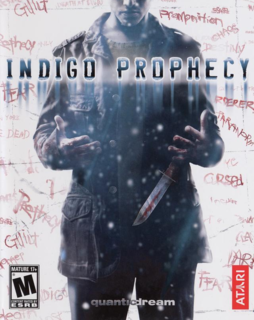A hybrid point-and-click/play-a-movie game that succeeds with an interesting story and some inventive controls.
Indigo Prophecy tells the story of Lucas, a typical everyman who viciously murders an innocent man while in a trance he's unable to stop. However, a power of premonition he's had since birth helps him to both escape police on his tail, and be able to attempt to fend off the power that is seeking to destroy him. He's doggedly pursued by two NYC detectives in the middle of a fearsome cold spell: Carla (who they may as well have just named Lennifer Jopez) and Tyler. You'll get to control both of them as well, as clues they uncover may help you decide what actions to take with Lucas, and even play a bit of their home lives. You'll also need to maintain everyone's emotional status, and not let them get too depressed. Along with help from his brother,Markus, and a mystical old lady, eventually Lucas learns who and what are out to kill him, what their ultimate goal is, and sets out to stop them with the fate of he, and the planet, on the line.
Instead of button controls, conversation starters and environmental interaction choices are handled with prompts to move the right analog stick, such a moving it right to open a drawer to the right and left for the left drawer. This unique control does a better job of making you feel a part of the action than previous games, and the addition of a timer when selecting conversation choices gives a better urgent/real-time aspect to the game. Getting to control Lucas' pursuers was an ingenius narrative decision, and you can attempt to help them or attempt to make choices that might actually help Lucas. And even moreso than how great a spin it adds to this game, you salivate wondering how your favorite games in the past could've been different with such a gameplay element.
The camera does suffer a bit, as sudden shifts cause you to accidentally reverse course, and keeping any given perspective on your envoronment can be a challenge. Luckily, this generally only occurs when you're running around looking for clues, not during life-or-death situations. The battle/mini-game controls of colored prompts to move both analog sticks also suffers occassionally when the prompts match up to similarly colored background elements, making it tough to discern what exactly you're to do. Luckily, again these issues crop up more in mini-games, not battles. Additionally, some go on very long with no checkpoint to fall back on--if you fail, you have to do the whole thing over. Some portions are too unoriginal, such as a horribly ripped-off Matrix-style battle that just seems cheesy, and the tacked on, out-of-left field love story near the end makes zero sense. The otherwise interesting concept of keeping up one's mental health is hindered a bit by both scripted events and seemingly innocuous actions that sharply lower it, leaving you with a frustrated 'why do I even bother trying to raise it?' feeling at times.
Camera quirks aside, the original control scheme works well, with only the occasional lack of a confirmation beep after moving the stick to really throw you off. Fine, upclose detail of character's faces is done very nicely, but the backgrounds and buildings do not hold up to the same level of detail. The game provides a great aural experience, with great voice acting and ambient sounds. The game is pretty short, with completion easily accomplished in under 10 hours and not a whole bunch of replayability. There are some amusing unlockables, including a fun dance scene with all the game's characters, reminiscent of the closing credits to Kingpin and There's Something About Mary. In the end, this is basically a 21st century spin on the 'cinema as game' genre. It's worth a play, and while maybe not a sequel, worthy of another game in the same style being created.

